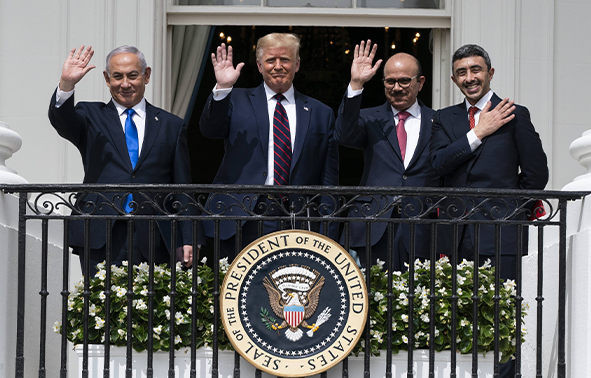The Abraham Accords: A New Era of Middle Eastern Diplomacy

Introduction
The Abraham Accords, signed in 2020, mark a significant turning point in Middle Eastern relations by normalising diplomatic ties between Israel and several Arab nations. This landmark agreement is crucial not only for the involved countries but also for global peace and security, given the region’s historically complex geopolitical landscape. Observers believe that the Accords may pave the way for future collaborations and stability in an area frequently marred by conflict.
Details of the Accords
The Abraham Accords were officially signed on September 15, 2020, in Washington, D.C., and facilitated the normalisation of relations between Israel, the United Arab Emirates (UAE), and Bahrain. Following these initial agreements, Sudan and Morocco also established ties with Israel. This rapid shift is seen by many as a departure from the longstanding Arab consensus that peace with Israel was contingent upon the resolution of the Palestinian conflict.
Impacts on the Region
Since the signing of the Accords, both Israel and the UAE have reported increased economic cooperation, including trade agreements worth billions of dollars. Tourism has flourished, with direct flights established between the nations—showcasing a growing acceptance and collaboration. Moreover, strategic alliances have emerged in areas like technology, water management, and renewable energy, suggesting a broader scope of partnership that could benefit the region.
Challenges Ahead
Despite these gains, obstacles persist. The Palestinian issue remains unresolved, with many Palestinians feeling sidelined and expressing concern that their plight is being overlooked in favour of Arab-Israeli relationships. This sentiment could pose challenges to the long-term viability of the Accords. Additionally, regional tensions, including those involving Iran and extremist groups, continue to threaten the fragile peace.
Conclusion
The Abraham Accords have undoubtedly changed the diplomatic landscape of the Middle East, with significant economic and strategic implications. As nations forge new paths towards cooperation, the full potential of these agreements remains to be realised. Continued dialogue and an inclusive approach that also encompasses Palestinian aspirations will be essential for sustaining momentum and ensuring a peaceful future in the region. The success of the Abraham Accords may ultimately depend on their ability to adapt to the evolving political landscape and address the concerns of all stakeholders.









